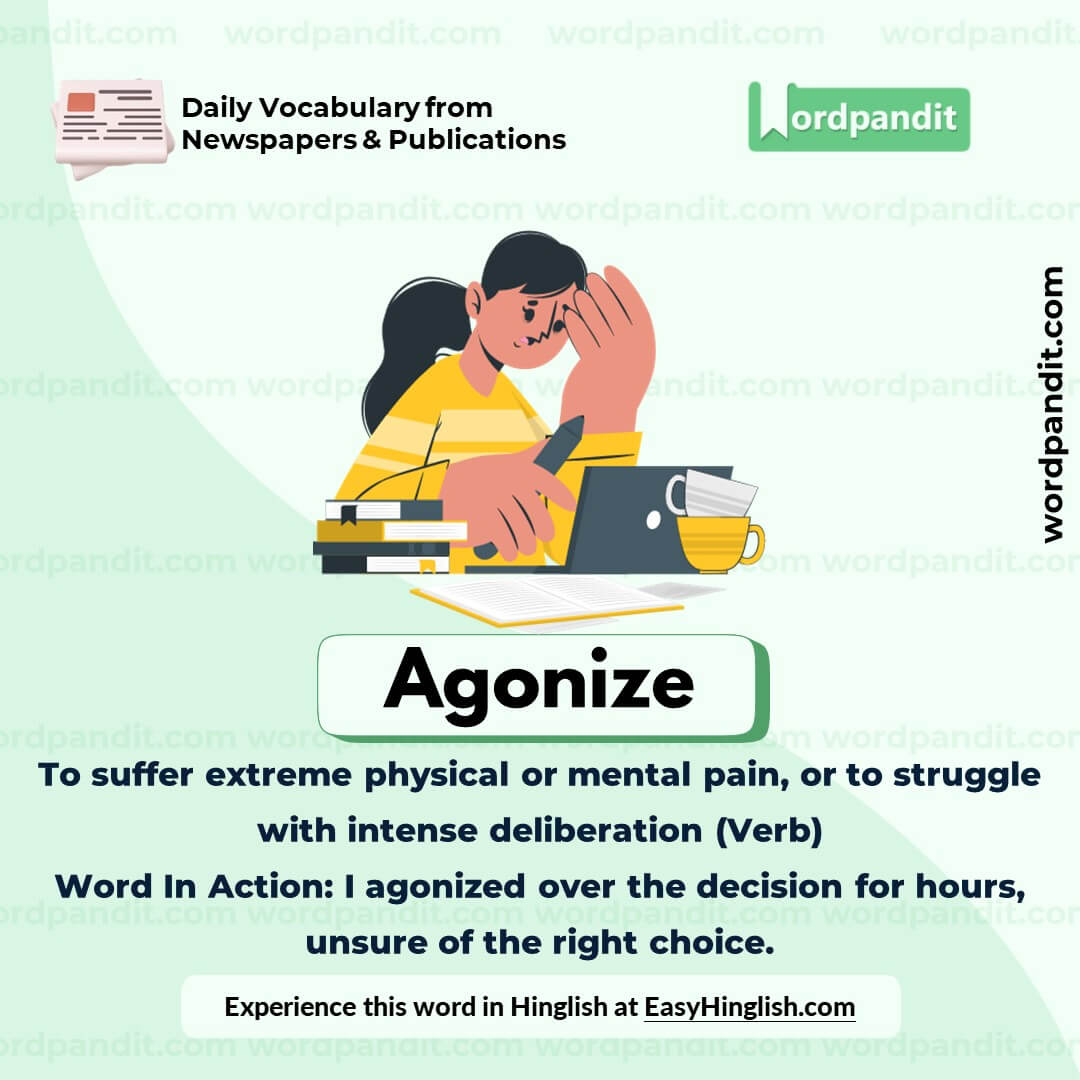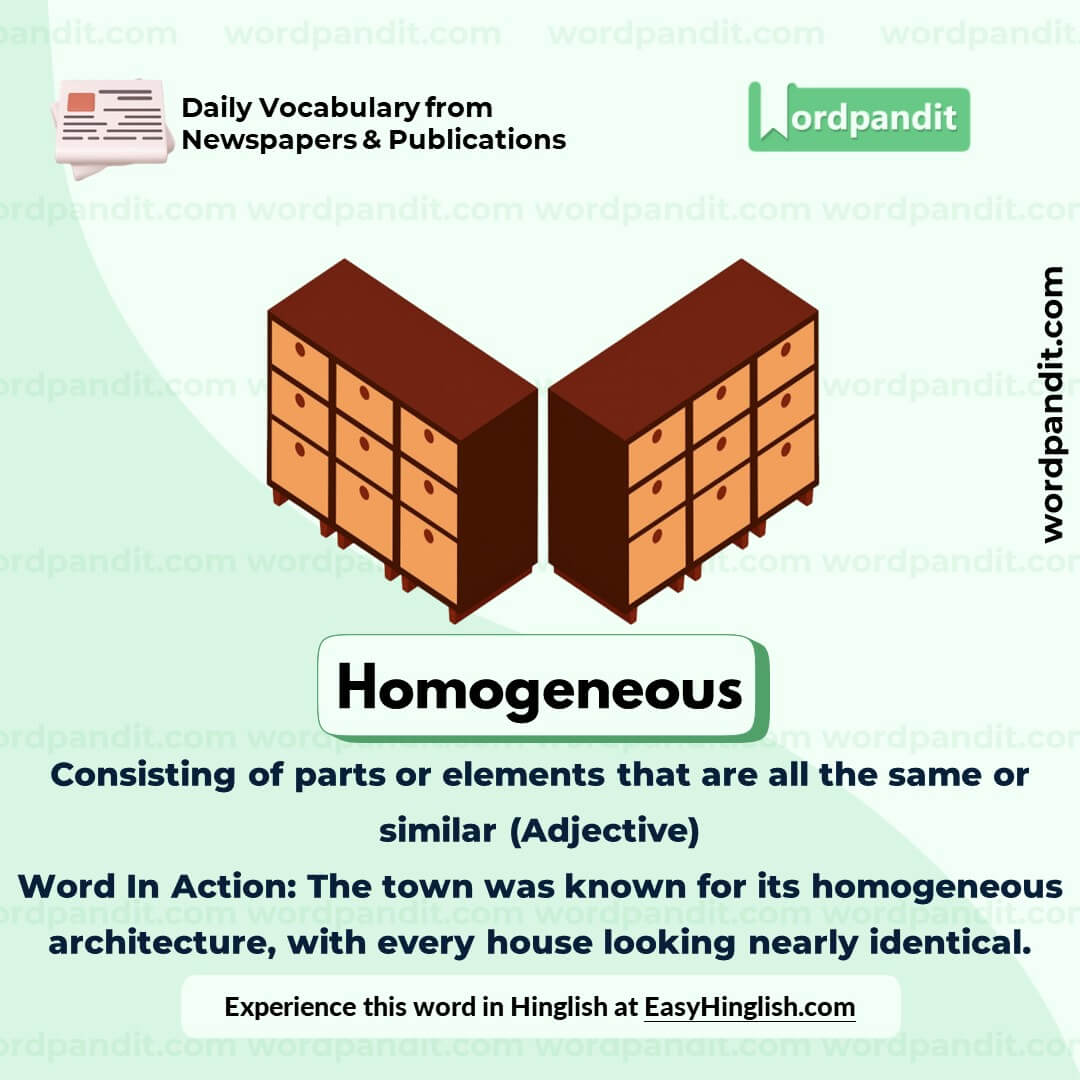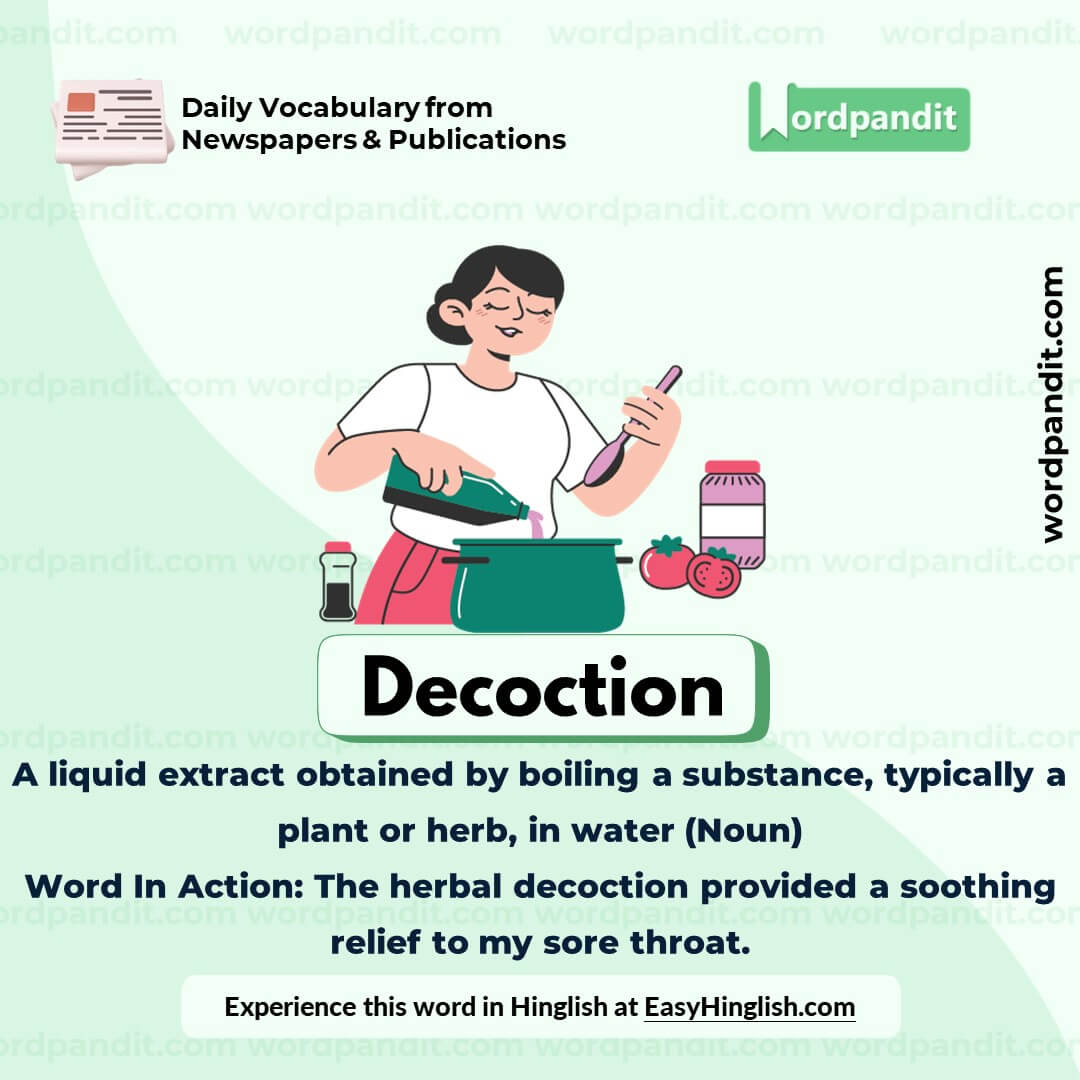Daily Vocabulary from International Newspapers and Publications
Expand Your Vocabulary with Wordpandit’s Global Vocabulary Hub
At Wordpandit, we are committed to helping you develop a truly global vocabulary by drawing from some of the most respected international publications. This section is designed to keep you ahead of the curve by introducing you to words that define global conversations and trends.
The Power of Global Sources
To help you think and communicate on a global scale, we curate vocabulary from renowned international sources, such as:
- The New York Times
- The Washington Post
- BBC
- The Guardian
- The Economist
- Scientific American
- Psychology Today
- And many more...
Stay Global, Stay Competitive
Our daily updates from international publications ensure you are consistently exposed to new words that reflect global news and developments, making sure your vocabulary is not only current but also globally relevant.
Enhance Your Global Perspective
Whether you’re preparing for international exams, aiming to excel in global business communication, or want to enhance your language skills for personal growth, Wordpandit offers the resources you need to thrive in a global context.
Effective Learning, Global Reach
Our learning methodology combines global examples, memory aids, and interactive activities, allowing you to internalize new words effectively and apply them in real-world scenarios.
Begin Your Global Vocabulary Journey Now!
Why Choose Wordpandit?
Practical Learning: Focus on words you'll actually encounter in real-world reading, enhancing your comprehension and communication skills.
Diverse Content: From current affairs to scientific breakthroughs, our varied sources expose you to vocabulary across multiple domains.
Effortless Integration: Make Wordpandit a part of your daily routine. Just a few minutes each day can significantly boost your lexicon over time.
Your Path to Vocabulary Mastery
- Visit our Daily Vocabulary section regularly
- Explore new words and their usage in context
- Practice incorporating these words into your own writing and speech
- Track your progress as your vocabulary expands
Start Your Journey Today
Embark on your vocabulary enhancement journey with Wordpandit. By consistently engaging with our daily posts, you'll build a robust vocabulary that serves you well in academic, professional, and personal contexts.
Remember, a word a day keeps linguistic limitations at bay. Make Wordpandit your daily companion in the quest for vocabulary excellence!
WORD-1: Agonize
Context:
"Damage each year and inflicts its agonising bite on millions of people. But the largest colonies, and most dramatic moments in the global spread of ant societies," - Aeon
Explanatory Paragraph:
The word "agonize" refers to undergoing intense pain or suffering, either physically or emotionally. It is often used to describe situations where someone is enduring extreme discomfort or struggling to make a difficult decision.
Meaning: To suffer extreme physical or mental pain, or to struggle with intense deliberation. (Verb)
Pronunciation: ag-uh-nize
Difficulty Level: ⭐⭐⭐ Intermediate
Etymology: Derived from the Greek word "agon," meaning a contest or struggle, which evolved into the late Latin "agonizare" and Old French "agoniser," ultimately entering English as "agonize."
Synonyms & Antonyms:
Synonyms: suffer, struggle, writhe, torment
Antonyms: delight, comfort, ease, rejoice
Usage Examples:
- She agonized over the decision for hours, unable to choose between the two options.
- Watching his team lose the championship caused him to agonize over missed opportunities.
- The patient agonized in pain while waiting for the doctor to arrive.
- Writers often agonize over finding the perfect words for their stories.
Cultural Reference:
"To be, or not to be: that is the question," a famous line from Shakespeare's *Hamlet*, encapsulates the agonizing deliberation of life's most profound choices. - William Shakespeare, *Hamlet*
Think About It:
Can agonizing over a decision lead to better outcomes, or does it often cause unnecessary stress and delay?
Quick Activity:
Write about a time when you agonized over a decision. How did you feel during the process, and what was the outcome?
Memory Tip:
Remember "agonize" by associating it with "agony," as both share the idea of intense pain or struggle.
Real-World Application:
"Agonize" is commonly used to describe the emotional and mental struggles people face in everyday life, such as making tough decisions, enduring hardships, or dealing with grief.
WORD-2: Homogeneous
Context:
"The relative genetic homogeneity of the small founder population, replicated across a growing network of nests, ensures that members of unicolonial species tolerate each other." - Aeon
Explanatory Paragraph:
"Homogeneous" describes something that is uniform or similar in composition, structure, or character. It often refers to groups or materials where the components are indistinguishable or consistent throughout.
Meaning: Consisting of parts or elements that are all the same or similar. (Adjective)
Pronunciation: hoh-muh-jee-nee-uhs
Difficulty Level: ⭐⭐⭐ Intermediate
Etymology: From the Greek "homogenēs," meaning "of the same kind," combining "homos" (same) and "genos" (kind or race).
Synonyms & Antonyms:
Synonyms: uniform, consistent, similar, identical
Antonyms: heterogeneous, diverse, varied, mixed
Usage Examples:
- The village was a homogeneous community where everyone shared the same traditions and values.
- Scientists examined the homogeneous mixture under a microscope to confirm its uniform composition.
- Homogeneous societies often find it challenging to adapt to cultural diversity.
- The team worked well together because of their homogeneous skill set and shared goals.
Cultural Reference:
The term "homogeneous" is frequently used in chemistry, such as describing a homogeneous solution where all components are evenly mixed, like salt dissolved in water.
Think About It:
In a globalized world, is striving for homogeneity in any context beneficial, or does it hinder progress and diversity?
Quick Activity:
Identify three examples of homogeneous groups or substances in your daily life. Explain what makes them homogeneous.
Memory Tip:
Remember "homogeneous" by breaking it down into "homo-" (same) and "-geneous" (kind), which together mean "of the same kind."
Real-World Application:
"Homogeneous" is widely used in science, engineering, and sociology to describe uniform systems, whether in materials, populations, or behaviors.
WORD-3: Patrician
Context:
"Patrician was also a title held by many princes and emperors from the 8th to 12th centuries." - Aeon
Explanatory Paragraph:
The term "patrician" historically refers to a person of noble or aristocratic lineage, particularly in ancient Rome, where it denoted members of the elite ruling class. Over time, the word expanded to describe anyone with refined manners, culture, or a distinguished status.
Meaning: A person belonging to the noble or aristocratic class, or someone with refined qualities (Noun).
Pronunciation: puh-TRIH-shuhn
Difficulty Level: ⭐⭐⭐ Intermediate
Etymology: From Latin "patricius," meaning "noble" or "of the father," derived from "pater" (father).
Synonyms & Antonyms:
Synonyms: Aristocrat, noble, elite, refined
Antonyms: Commoner, peasant, plebeian
Usage Examples:
- The grand mansion reflected the patrician taste of its owner.
- She carried herself with a patrician elegance that turned heads wherever she went.
- In ancient Rome, only the patricians were allowed to hold certain political offices.
- The author's patrician style of writing made his books a favorite among the literary elite.
Cultural Reference:
"In Florence during the Renaissance, the patrician class played a significant role in financing and inspiring great works of art." - Historical Studies
Think About It:
How does the concept of "patrician" compare to the modern-day elite, and what qualities are valued in such a class today?
Quick Activity:
List three characteristics you think are associated with a patrician individual. How do they differ from those of a commoner?
Memory Tip:
Think of "patrician" as someone with "paternal" qualities, linked to a noble "fatherly" lineage or status.
Real-World Application:
The term "patrician" is often used today to describe someone with sophisticated tastes, manners, or an air of aristocracy, even in non-aristocratic contexts.
WORD-4: Decoction
Context:
"Soups, and wash your hands in a decoction of it,’ complained one British visitor in 1851. When the red fire ant (S invicta), probably the best-known unicolonial species, spread through the US." - Aeon
Explanatory Paragraph:
"Decoction" refers to a liquid preparation made by boiling a substance, often medicinal or herbal, to extract its essence or active components. It is commonly used in traditional medicine and culinary practices to concentrate flavors or healing properties.
Meaning: A liquid extract obtained by boiling a substance, typically a plant or herb, in water. (Noun)
Pronunciation: dih-kok-shun
Difficulty Level: ⭐⭐⭐ Intermediate
Etymology: Derived from the Latin "decoquere," meaning "to boil down," combining "de-" (down) and "coquere" (to cook).
Synonyms & Antonyms:
Synonyms: extract, brew, concentrate, reduction
Antonyms: dilution, infusion
Usage Examples:
- The herbalist prepared a decoction of ginger and turmeric to help with digestion.
- The recipe called for a decoction of bones and vegetables to create a rich soup base.
- She washed her wounds with a decoction of medicinal herbs to promote healing.
- Traditional healers often rely on decoctions to deliver potent remedies.
Cultural Reference:
Decoctions are a cornerstone of traditional medicine in many cultures, such as Ayurveda and Traditional Chinese Medicine, where herbs are boiled to create healing remedies.
Think About It:
How does the process of decoction enhance the potency of ingredients compared to other preparation methods like infusion?
Quick Activity:
Find a recipe or remedy that uses a decoction. Try preparing it and note how the boiling process affects the flavor or effectiveness of the ingredients.
Memory Tip:
Remember "decoction" by associating it with "decrease by boiling," as the process involves boiling down a substance to extract its essence.
Real-World Application:
"Decoction" is widely used in both traditional medicine for making herbal remedies and in modern cooking for creating flavorful stocks and broths.
WORD-5: Dislodged
Context:
"Sostrils in such numbers that they could be dislodged only by repeatedly dunking the infant in water." - Aeon
Explanatory Paragraph:
The word "dislodged" means to remove or force something out of its place, often after it has been stuck or settled. It can be used to describe physical movement, like removing an object, or metaphorical contexts, like changing someone's position or status.
Meaning: To remove or force something out of its place. (Verb)
Pronunciation: dis-loj-d
Difficulty Level: ⭐⭐ Beginner
Etymology: From the Old French "deslogier," combining "des-" (away) and "logier" (to lodge), meaning to remove from a place of rest or lodging.
Synonyms & Antonyms:
Synonyms: remove, eject, extract, oust
Antonyms: embed, secure, lodge, anchor
Usage Examples:
- The wind dislodged several tiles from the roof during the storm.
- The hiker dislodged a rock while climbing, sending it tumbling down the slope.
- The protestors hoped to dislodge the corrupt official from his position.
- A gentle tap dislodged the key that had been stuck in the lock.
Cultural Reference:
The word "dislodged" is often used in military or political contexts, such as battles where entrenched forces are dislodged from their positions or leaders removed from power.
Think About It:
How does the act of dislodging—whether physical or metaphorical—affect stability in systems or societies?
Quick Activity:
Think of an object or idea that is difficult to dislodge. Write a short paragraph explaining why it is so firmly fixed.
Memory Tip:
Link "dislodged" to "dis-" (away) and "lodge" (to stay), helping you remember it means "to move away from where it is lodged."
Real-World Application:
"Dislodged" is used in daily life to describe removing stuck items, in medicine to describe removing foreign bodies, and in politics to describe shifts in power or influence.
















